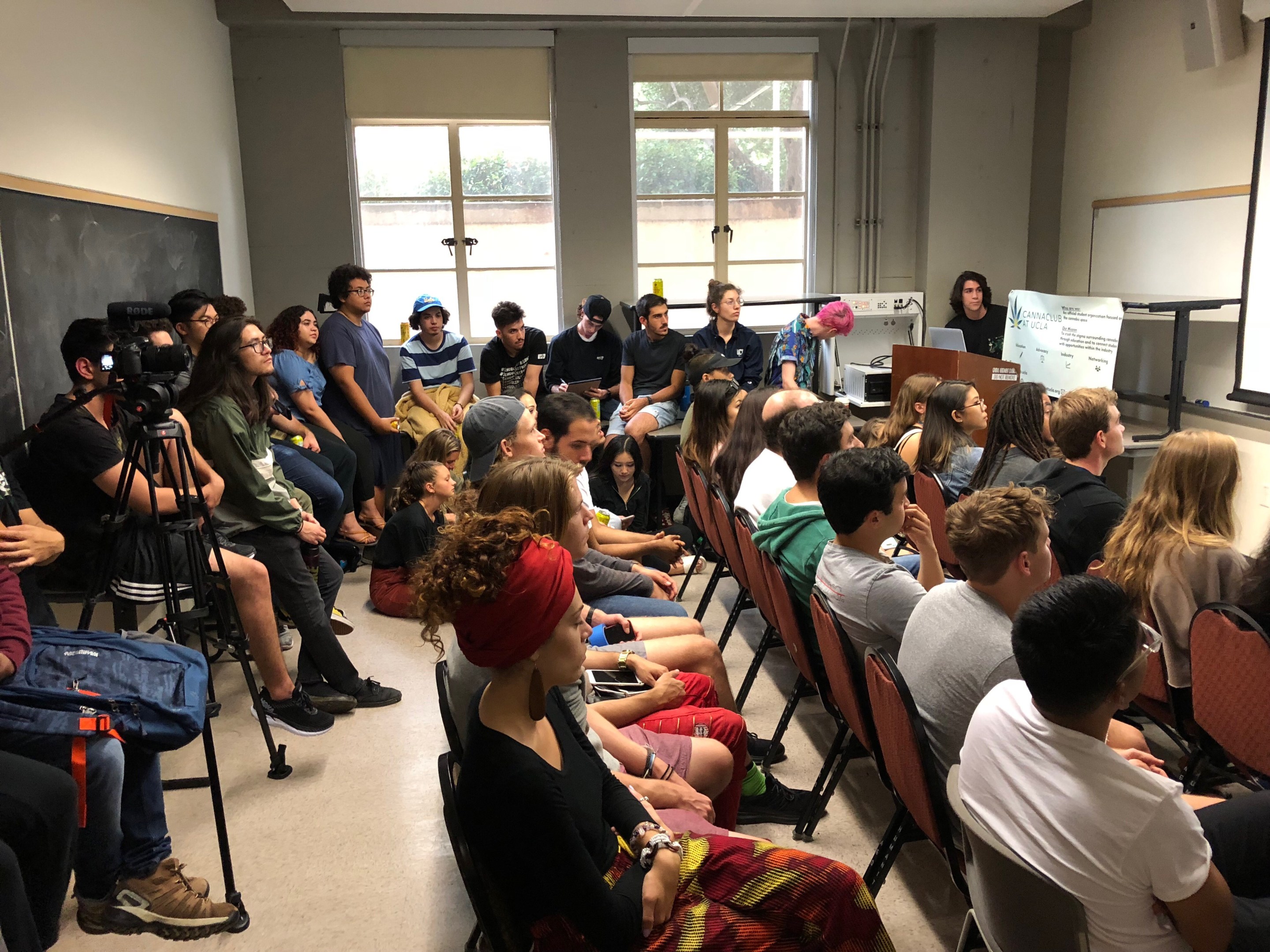[dropcap size=big]A[/dropcap]t a recent Wednesday evening in a bare-bones basement classroom on the UCLA campus, students filled chairs, perched on table tops, and stood in the corners to learn about one thing: cannabis. Despite the beginnings of a rare L.A. rain, the 6 p.m. start time, and the fact that students receive no credits for being there, this particular UCLA class attracted about 20 people.
The inaugural run of a student-run weed class at UCLA is finishing out for the year. The lecture series, dubbed Cannabis 101, is a twice-monthly session created by UCLA’s new cannabis-centric club, Cannaclub. Formed in February in an attempt to dispel stigma surrounding weed, and help connect students with jobs in the exploding legal cannabis industry, Cannaclub consists of a core 30 to 40 members with hundreds more connected through social media and an email chain.
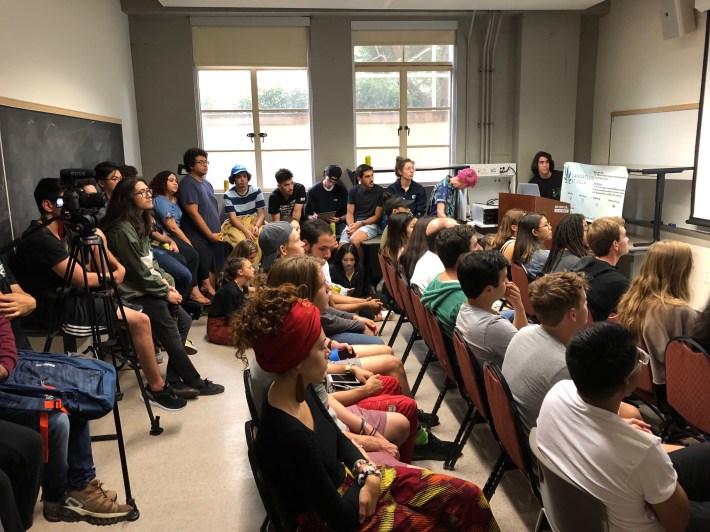
Mexico's Drug War
[dropcap size=big]T[/dropcap]he club was founded by Eugenio Castro Garza; a sophomore majoring in political science who moved to the U.S. from Cancún to enroll in college for one purpose.
“I came to UCLA a year ago with the explicit mentality of wanting to do something in cannabis,” he told L.A. Taco.
Castro, who has dual citizenship in Mexico and the U.S., was born in Texas to Mexican parents but spent the bulk of his life living in Mexico. Growing up in Cancún - “the crown jewel of tourism,” he said – Castro's nuclear family was largely safe from the impending threat of drug cartels. However, he witnessed the bloodshed firsthand as his friends and family in Northern Mexico, where his mom is from, weathered shootings, kidnappings, and threats of violence at the hands of drug lords.
“There was a lot of people being killed and kidnapped, and all of this violence stemmed from the powerful drug cartels,” Castro recalled.
RELATED: Two People Shot Dead at Unlicensed K-Town Cannabis Shop ~ No IDs Released Yet
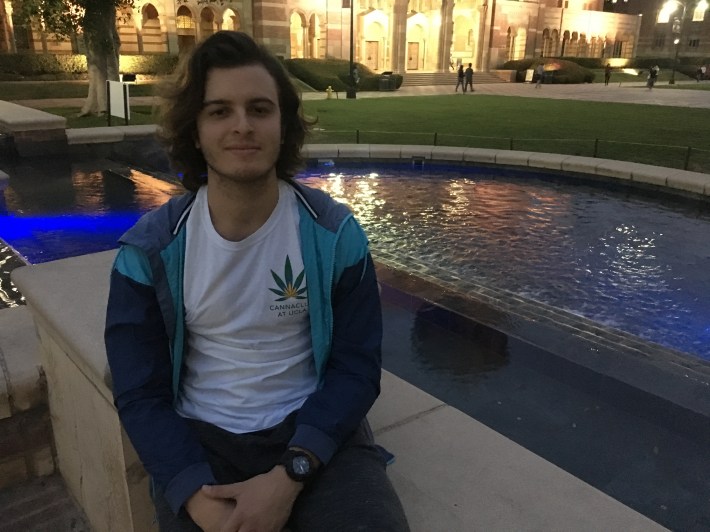
As a result, Castro was taught from a young age that weed was evil. His parents firmly believed it was “the devil’s lettuce,” he said. For a time, Castro believed that the mentality behind the war on drugs was correct. In short, drugs are bad and the only way to stem the trade was try to arrest and punish all involved.
But as Castro began to watch states in America legalize the drug, he started to do his own research on the topic. With the help of YouTube videos, Netflix documentaries, and films by the widely heralded Dr. Sanjay Gupta, he realized that cannabis itself wasn’t the problem – and legalizing it may be the best chance Mexico has to reduce the stranglehold of the cartels.
“It was really a huge change of perception and the world in general,” he said.
Roughly 30 percent of the drug cartels’ income is thought to come from cannabis, Castro explained, citing data he picked up through his research, which is echoed in media coverage. Legalization could mean cutting significantly into their profits. That in turn, could diminish their power and capacity for violence.
So learning about legalization became Castro’s mission. As a senior in high school, he decided to apply to University of California colleges, knowing that weed would soon be legal in the state, and California would become the largest commercial market in the world. He uprooted to Westwood and after less than a year at UCLA, co-founded Cannaclub to spread “objective, science-based cannabis education” at the school. The club also strives to build relationships with various cannabis companies to secure internships, part-time gigs and eventually, full-time jobs for students and recent graduates heading into the legal cannabis industry.
Weed is ubiquitous at UCLA, yet there’s a “severe lack” of awareness surrounding it, according to Castro. “Everyone talks about it. A lot of people smoke it,” he said. “There seems like there needs to be an educational resource.”
RELATED: Weed Is Finally Legal to Pack When Flying Out of LAX, But There’s a Catch
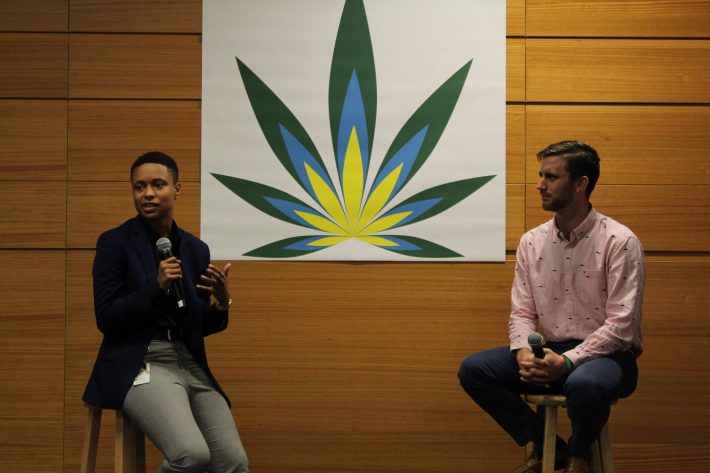
Cannabis 101
[dropcap size=big]T[/dropcap]hat’s where the lecture series, Cannabis 101 comes in. In its inaugural quarter, this twice-monthly class doesn’t provide students with academic credit, but rather a comprehensive overview of the local industry. It also covers the politics, economics, and logistics of legalized cannabis at-large. Castro and his fellow club board members designed the syllabus for Cannabis 101, which combines UCLA’s own pool of professors with real-world professionals and notable figures in the local cannabis industry.
Guests have included Cat Packer, the executive director of the Los Angeles Department of Cannabis Regulation, who gave an overview of the local industry and regulatory efforts. Recently Ana Hory, chief executive officer of Enlucem, was on hand to talk about her consulting firm’s research on consumer cannabis habits and what it’s like working with cannabis companies on marketing and outreach campaigns.
Cannaclub co-founder Arazoo Shwany, a fifth-year pre-med student with prior experience in the cannabis industry, said it is UCLA’s responsibility as a top research institution to create a space for students to get involved with cannabis. “I think with legalization, it’s such a pivotal moment in history,” she said. Shwany wore a delicate, gold marijuana leaf necklace around her neck.
There’s plenty of overlap between the weed industry and the medical field, Shwany said. So although she’s applying to medical school, she’s hoping to use her degree to bolster her work if she decides to teach, write about, or become involved in cannabis public policy. It’s also driven her interest in addiction medicine, and researching alternative pain medications to help combat the opioid crisis.
RELATED: Welcome to the World of Weed Corridos, or ‘Corridos Verdes’
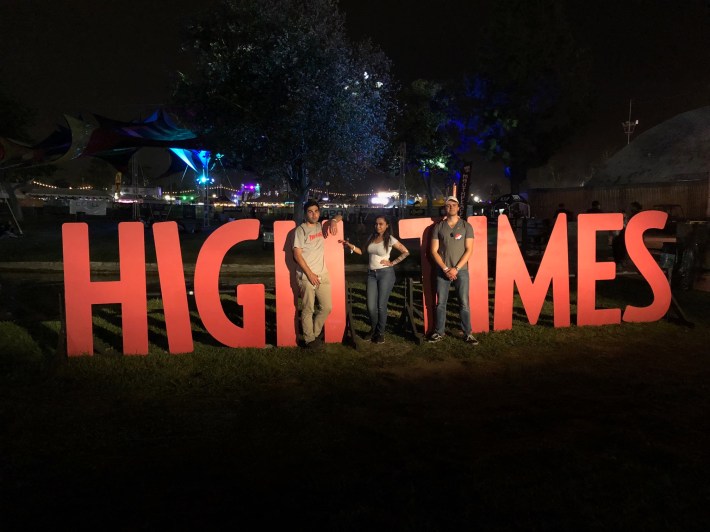
Still, Shwany realizes the lingering stigma associated with cannabis, which is why even her parents don’t know she’s involved with Cannaclub. They’re “conservative” and “a drug is a drug” to them, she said. She’s thought twice publicizing her involvement for the sake of her career as well. “Trying to go into medicine, I was cautious at first because, how are professionals going to look at this?” she said.
The course Shwany and Castro helped create is intended to show school administrators and the academic community that there’s demand – and a real educational structure – for a cannabis course. By next fall, Castro hopes that some version of Cannabis 101 can be offered for academic credit alongside the likes of Chemistry, Women’s Studies, and Anthropology.
“The goal is for next year, to have this be a full-on, catalogued class at UCLA that the school offers,” Castro said.
He’s also begun to connect with cannabis clubs on other college campuses throughout the country. They are still few and far between – including Green Wolverine at the University of Michigan and the UNLV Rebels CAN at the UNLV – but most exist to spread reliable information about cannabis and establish connections to the professional industry.
Post-academic life, Castro said he plans to stay in California long enough to become well-versed in cannabis policy, work in multiple facets of the local industry, and then head back to Mexico, possibly as a lobbyist or part of a non-profit, to help his home state implement its own system of legalization.
RELATED: Weed Waste: This is How You Can Recycle Your Empty Weed Canisters
